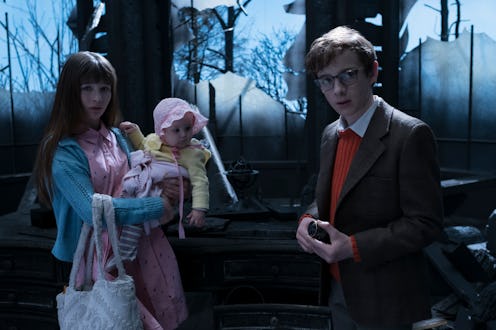
There's no such thing as a fourth wall in A Series Of Unfortunate Events. Not only is the Netflix series' narrator, Lemony Snicket, constantly reminding you that what you're witnessing is a television program, but he actively warns viewers against watching it, instead urging us to turn to something more pleasing. The series' self-referential nature isn't limited to the narrator, either. It seems that alongside Snicket, certain characters within the story are acutely aware that they are living inside a long-form television program on a streaming platform. With each episode jam-packed with references and allusions to pop culture, the original book series, and the show itself, it's easy to miss some of the meta references in A Series Of Unfortunate Events.
Perhaps the only reason this very dire fable is entertaining is because it takes the time to remind the audience that they're watching a television show and aren't directly involved in the events of this most unfortunate series. Otherwise, watching the many deaths that occur and the depths of despair that the Baudelaire orphans are victim to could be too overwhelming for any audience member with even a slight amount of heart left in them. If you need a comforting reminder that these Unfortunate Events are, in fact, fictional, here are all of the fourth wall-shattering moments in Season 1 of A Series Of Unfortunate Events, separated by story.
The Bad Beginning
The first story of the season is also the most chock-full of self-referential moments.
- Snicket opens the series by looking to the camera and stating, “You, in the audience, have no such obligation. I would advise all our viewers to turn away immediately and watch something more pleasant instead.” Snicket continues to deliver similar warnings at the beginning of every episode, reminding viewers that there are plenty of other things they could be streaming instead of this sad tale.
- At the beginning of the second episode, Snicket makes a knowing reference to the title, asking “Why did the Baudelaire orphans suffer through this Series of Unfortunate Events?“
- Count Olaf tells Justice Strauss, “You will suddenly find yourself in the enviable position of being a struggling actress in middle age.” Justice Strauss is played by Emmy-winning actor Joan Cusack, who arguably struggled during the mid-point of her career, but has made a well-deserved comeback.
- In an interview with The Daily Punctilio, Count Olaf says, “I think live theater is a much more powerful medium than, say, streaming television.” Olaf is, of course, played by esteemed Broadway star and theatrical actor Neil Patrick Harris, who is saying this line while starring on a Netflix series.
The Reptile Room
Episodes 3 and 4 feature more instances of meta humor, and the most obvious fourth-wall break in a series full of them.
- At the start of the third episode, Poe bluntly states, “It’s a brand new episode in your lives, Baudelaires.”
- Olaf, in disguise as Stefano, discusses the merit of television over movies over dinner. “I prefer long-form television to the movies. It’s so much more convenient to consume entertainment from the comfort of your own home.” This would be odd enough as it stands, but then Olaf turns directly into the camera and paints his face with a sinister grin before turning back to the scene.
- The movie theater that the Baudelaires attend happens to be showing the fictional film Men In Beige. This is likely a reference to Unfortunate Events' director and executive producer Barry Sonnenfield, who also directed Men In Black
The Wide Window
The next two episodes don't feature as many meta references as the previous stories, leaving the audience with little relief from this especially depressing entry. However, there are a few moments where the show is happy to break the fourth-wall for this story.
- The seller of the "Roly Poly Fish Heads" is actually Daniel Handler, the author behind Lemony Snicket and A Series Of Unfortunate Events.
- As the boat of the Baudelaire Orphans and Aunt Josephine is being bombarded with Lachrymose Leeches, Aunt Josephine shrieks, “Let’s all close our eyes as if we’re watching some on-screen entertainment that’s too scary for people our age!”
The Miserable Mill
The final story of Season 1 brings back the series' penchant for meta-humor in a big way.
- When Mr. Poe discovers the Baudelaires are missing and have escaped to the Lucky Smells Lumber Mill, he proclaims, “It’s a disaster! It’s a catastrophe! It’s off-book!” In the original books, Poe himself takes the Baudelaires to the mill, meaning they've literally gone away from the books.
- At one point during their stay at the mill, the narrator states that "Violet was asking all the wrong questions." Snicket's companion series about the origins of the secret organization in Unfortunate Events is called All The Wrong Questions.
- Count Olaf asks the children if they've learned anything "this year? This week? This season?", referencing the unclear timeline over which the series takes place.
- Similarly, when Mr. Poe drops the children off at their newest home in the final moments of the finale, he informs them that they'll have a lot of catching up to do as it's "the end of the season, uh, semester.”
A Series Of Unfortunate Events is masterful at keeping the audience on their toes, no matter what medium the story is told in. It also begs some frightening questions, like why does Olaf know so much about the television format and how it's applied to the Baudelaires? Does he know we're watching the story unfold?
While many shows use meta humor for a simple laugh, Unfortunate Events actually also manages to use these references to make the audience question what they're seeing. There's really nothing like it on television, and it's going to be an unfortunately long wait to find out what meta trickery awaits in Season 2 of A Series Of Unfortunate Events.